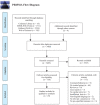Extracorporeal cardiopulmonary resuscitation for refractory cardiac arrest: a scoping review
- PMID: 33615309
- PMCID: PMC7880165
- DOI: 10.1002/emp2.12380
Extracorporeal cardiopulmonary resuscitation for refractory cardiac arrest: a scoping review
Abstract
Background: Extracorporeal cardiopulmonary resuscitation (ECPR) is an emerging concept in cardiac arrest and cardiopulmonary resuscitation. Recent research has documented a significant improvement in favorable outcomes, notable survival to discharge, and neurologically intact survival.
Objectives: The present study undertakes a scoping review to summarize the available evidence by assessing the use of ECPR, compared with no ECPR or the standard of care, for adult patients who sustain cardiac arrest in any setting, in studies which record survival and neurologic outcomes.
Methods: This review followed the PRISMA extension for scoping reviews (PRISMA-ScR) guidelines. Four online databases were used to identify papers published from database inception to July 12, 2020. We selected 23 observational studies from Asia, Europe, and North America that used survival to discharge or neurologically intact survival as a primary or secondary endpoint variable in patients with cardiac arrest refractory to standard treatment.
Results: Twenty-three observational studies were included in the review. Eleven studies were of out-of-hospital cardiac arrest, 7 studies were of in-hospital cardiac arrest, and 5 studies included mixed populations. Ten studies reported long-term favorable neurological outcomes (ie, Cerebral Performance Category score of 1 - 2 at 3 months [n = 3], 6 months [n = 3], and 1 year [n = 4]), of which only 4 had statistical significance at 5% significance levels. Current knowledge is mostly drawn from single-center observations, with most of the evidence coming from case series and cohort studies, hence is prone to publication bias. No randomized control trials were included.
Conclusions: This scoping review highlights the need for high-quality studies to increase the level of evidence and reduce knowledge gaps to change the paradigm of care for patients with shock-refractory cardiac arrest.
Keywords: ECPR; cardiac arrest; extracorporeal cardiopulmonary resuscitation; extracorporeal life support; extracorporeal membrane oxygenation; refractory ventricular fibrillation; resuscitation.
© 2021 The Authors. JACEP Open published by Wiley Periodicals LLC on behalf of American College of Emergency Physicians.
Conflict of interest statement
The authors declare no conflict of interest.
Figures


References
-
- Link MS, Berkow LC, Kudenchuk PJ, et al. Part 7: adult advanced cardiovascular life support: 2015 American Heart Association Guidelines update for cardiopulmonary resuscitation and emergency cardiovascular care. Circulation. 2015;132:S444‐S464. - PubMed
-
- Soar J, Nolan JP, Böttiger BW, et al. European Resuscitation Council Guidelines for Resuscitation 2015: section 3. Adult advanced life support. Resuscitation. 2015;95:100‐147. - PubMed
-
- Benjamin EJ, Muntner P, Alonso A, et al. Heart Disease and Stroke Statistics–‐2019 Update: a report from the American Heart Association. Circulation. 2019;139:e56‐528. - PubMed
-
- Koster RW, Walker RG, Chapman FW. Recurrent ventricular fibrillation during advanced life support care of patients with prehospital cardiac arrest. Resuscitation. 2008;78:252‐257. - PubMed
-
- Keebler ME, Haddad EV, Choi CW, et al. Venoarterial extracorporeal membrane oxygenation in cardiogenic shock. JACC: Heart Failure. 2018;6:503‐516. - PubMed
Publication types
LinkOut - more resources
Full Text Sources
Other Literature Sources
